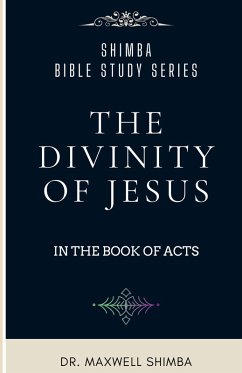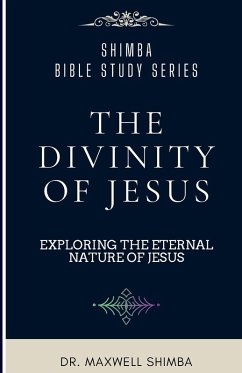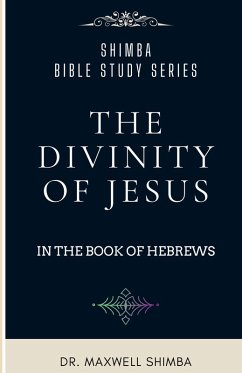
The Divinity of Jesus in the Gospel of John
Versandkostenfrei!
Versandfertig in 1-2 Wochen
22,99 €
inkl. MwSt.

PAYBACK Punkte
11 °P sammeln!
The Divinity of Jesus in the Gospel of John Dr. Maxwell Shimba's exploration of the Gospel of John provides a profound analysis of the divinity of Jesus Christ, emphasizing His eternal nature and divine authority. In the prologue of John's Gospel, Dr. Shimba highlights how Jesus is identified as the Word (Logos), who was with God and was God from the beginning (John 1:1-3). This foundational declaration sets the stage for understanding Jesus not merely as a historical figure but as the pre-existent, divine agent of creation. Shimba elucidates how this profound theological statement underscores...
The Divinity of Jesus in the Gospel of John Dr. Maxwell Shimba's exploration of the Gospel of John provides a profound analysis of the divinity of Jesus Christ, emphasizing His eternal nature and divine authority. In the prologue of John's Gospel, Dr. Shimba highlights how Jesus is identified as the Word (Logos), who was with God and was God from the beginning (John 1:1-3). This foundational declaration sets the stage for understanding Jesus not merely as a historical figure but as the pre-existent, divine agent of creation. Shimba elucidates how this profound theological statement underscores Jesus' role in the divine plan and His intrinsic unity with the Father, establishing His credentials as God incarnate. Throughout his analysis, Dr. Shimba points to the numerous "I Am" statements made by Jesus, which echo the divine self-identification of Yahweh in the Old Testament (Exodus 3:14). Statements such as "I am the bread of life" (John 6:35), "I am the light of the world" (John 8:12), and "I am the resurrection and the life" (John 11:25) are examined in detail. Shimba argues that these declarations are not merely metaphorical but are deliberate assertions of Jesus' divine identity and His role as the source of spiritual sustenance, illumination, and eternal life. Each "I Am" statement reveals a different facet of Jesus' divine nature and His mission to fulfill God's redemptive purposes. Dr. Shimba also emphasizes the significance of the signs and miracles recorded in John's Gospel as demonstrations of Jesus' divine power. From turning water into wine at Cana (John 2:1-11) to raising Lazarus from the dead (John 11:1-44), these miracles serve as tangible evidence of Jesus' authority over nature, illness, and death. Shimba explains how these signs are intended to lead observers to a deeper faith in Jesus as the Christ and the Son of God, affirming His divine origin and mission. Each miracle not only addresses immediate human needs but also points to the greater spiritual reality of Jesus' divine intervention in human history. In discussing Jesus' relationship with God the Father, Dr. Shimba underscores the profound unity and intimacy that John portrays. Passages such as John 10:30, where Jesus declares, "I and the Father are one," and John 14:9, where Jesus tells Philip, "Anyone who has seen me has seen the Father," are pivotal in Shimba's analysis. He highlights how these statements reflect the mutual indwelling and shared essence of the Father and the Son, reinforcing the Trinitarian understanding of God. This unity is further demonstrated through Jesus' obedience to the Father's will, culminating in His sacrificial death on the cross. Dr. Shimba delves into the theological implications of Jesus' crucifixion and resurrection, viewing them as the ultimate manifestations of His divine nature. The crucifixion, described in John 19, is seen not merely as a tragic event but as the fulfillment of Old Testament prophecies and the demonstration of Jesus' sacrificial love. Shimba explains how Jesus' declaration "It is finished" (John 19:30) signifies the completion of His redemptive mission. The resurrection, detailed in John 20, is presented as the definitive proof of Jesus' victory over death and His divine authority. Shimba argues that the resurrection validates all of Jesus' claims about His identity and mission. Finally, Dr. Shimba's work highlights the purpose of John's Gospel, which is to lead readers to believe that Jesus is the Messiah, the Son of God, and that by believing, they may have life in His name (John 20:30-31). He emphasizes that this belief is not merely intellectual assent but a transformative faith that results in a personal relationship with Jesus. Shimba's analysis invites readers to encounter Jesus through the Gospel of John, to recognize His divinity, and to experience the abundant life that He offers.














